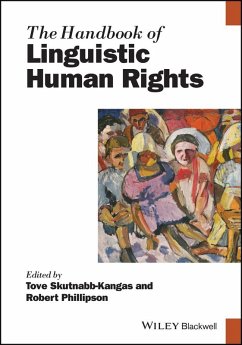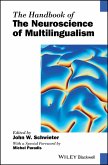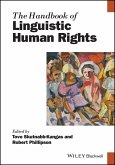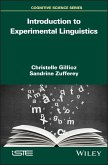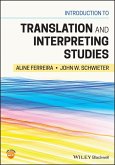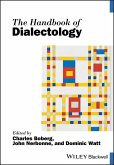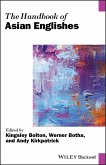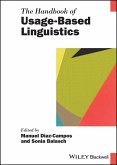A groundbreaking new work that sheds light on case studies of linguistic human rights around the world, raising much-needed awareness of the struggles of many peoples and communities The first book of its kind, the Handbook of Linguistic Human Rights presents a diverse range of theoretically grounded studies of linguistic human rights, exemplifying what linguistic justice is and how it might be achieved. Through explorations of ways in which linguistic human rights are understood in both national and international contexts, this innovative volume demonstrates how linguistic human rights are supported or violated on all continents, with a particular focus on the marginalized languages of minorities and Indigenous peoples, in industrialized countries and the Global South. Organized into five parts, this volume first presents approaches to linguistic human rights in international and national law, political theory, sociology, economics, history, education, and critical theory. Subsequent sections address how international standards are promoted or impeded and cross-cutting issues, including translation and interpreting, endangered languages and the internet, the impact of global English, language testing, disaster situations, historical amnesia, and more. This essential reference work: * Explores approaches to linguistic human rights (LHRs) in all key scholarly disciplines * Assesses the strengths and weaknesses of international law Covenants and Declarations that recognize the LHRs of Indigenous peoples, minorities and other minoritized groups * Presents evidence of how LHRs are being violated on all continents, and evidence of successful struggles for achieving linguistic human rights and linguistic justice * Stresses the importance of the mother tongues of Indigenous peoples and minorities being the main teaching/learning languages for cultural identity, success in education, and social integration * Includes a selection of short texts that present additional existential evidence of LHRs Edited by two renowned leaders in the field, the Handbook of Linguistic Human Rights is an ideal resource for undergraduate and graduate students of language and law, sociolinguistics, applied linguistics, language policy, language education, indigenous studies, language rights, human rights, and globalization.
Dieser Download kann aus rechtlichen Gründen nur mit Rechnungsadresse in A, B, BG, CY, CZ, D, DK, EW, E, FIN, F, GR, HR, H, IRL, I, LT, L, LR, M, NL, PL, P, R, S, SLO, SK ausgeliefert werden.
"Compelling testament to the urgency of ensuring linguistic human rights worldwide and to Skutnabb-Kangas' and Phillipson's vision and tenacity in illuminating the field for half a century."
Nancy H. Hornberger, Professor Emerita, University of Pennsylvania
"Our ability to communicate through language is central to our constitution, evolution, and identity as humans. It is therefore not surprising that this core characteristic of who we are has always been contested as social groups vie for advantage and superiority. The Handbook of Linguistic Human Rights brilliantly brings these realities into the 21st century, combining academic analysis, personal accounts, and evidence-based directions for change. The authors have created a repository of information and inspiration that will fuel language activism for many years to come."
Jim Cummins, Professor, The University of Toronto
"This impressive and engaging edited Handbook is not only global in coverage and truly comprehensive in scope, it also introduces and formulates the concept linguistic human rights through state-of-the-art theoretical, legal and conceptual discussions. National and thematic examples of violations or good implementation are rounded out by evidence statements on some of humanity's most discerning linguistic identity violations."
Tove H. Malloy, Professor of European Studies, Europa-Universität Flensburg
"An extraordinarily multifaceted handbook, covering theory and implementation, opportunities and obstacles, global and local perspectives, voices of academics and practitioners. It demonstrates why paying due attention to the - still too often neglected - linguistic dimension of human rights is so crucial for a world in which no one will be left behind."
Goro Christoph Kimura, Professor, Sophia University, Tokyo
"The handbook is exceptionally valuable for understanding and appreciating the concept of linguistic human rights and their significance for social and linguistic justice. It is well organised, illuminating and highly interesting in its entirety. It can therefore be warmly recommended not only to lawyers and students of law, but to all those interested in the protection of linguistic rights of all people and some form of linguistic justice."
Marijana Javornik Fubric, Professor, Zagreb University
Nancy H. Hornberger, Professor Emerita, University of Pennsylvania
"Our ability to communicate through language is central to our constitution, evolution, and identity as humans. It is therefore not surprising that this core characteristic of who we are has always been contested as social groups vie for advantage and superiority. The Handbook of Linguistic Human Rights brilliantly brings these realities into the 21st century, combining academic analysis, personal accounts, and evidence-based directions for change. The authors have created a repository of information and inspiration that will fuel language activism for many years to come."
Jim Cummins, Professor, The University of Toronto
"This impressive and engaging edited Handbook is not only global in coverage and truly comprehensive in scope, it also introduces and formulates the concept linguistic human rights through state-of-the-art theoretical, legal and conceptual discussions. National and thematic examples of violations or good implementation are rounded out by evidence statements on some of humanity's most discerning linguistic identity violations."
Tove H. Malloy, Professor of European Studies, Europa-Universität Flensburg
"An extraordinarily multifaceted handbook, covering theory and implementation, opportunities and obstacles, global and local perspectives, voices of academics and practitioners. It demonstrates why paying due attention to the - still too often neglected - linguistic dimension of human rights is so crucial for a world in which no one will be left behind."
Goro Christoph Kimura, Professor, Sophia University, Tokyo
"The handbook is exceptionally valuable for understanding and appreciating the concept of linguistic human rights and their significance for social and linguistic justice. It is well organised, illuminating and highly interesting in its entirety. It can therefore be warmly recommended not only to lawyers and students of law, but to all those interested in the protection of linguistic rights of all people and some form of linguistic justice."
Marijana Javornik Fubric, Professor, Zagreb University

